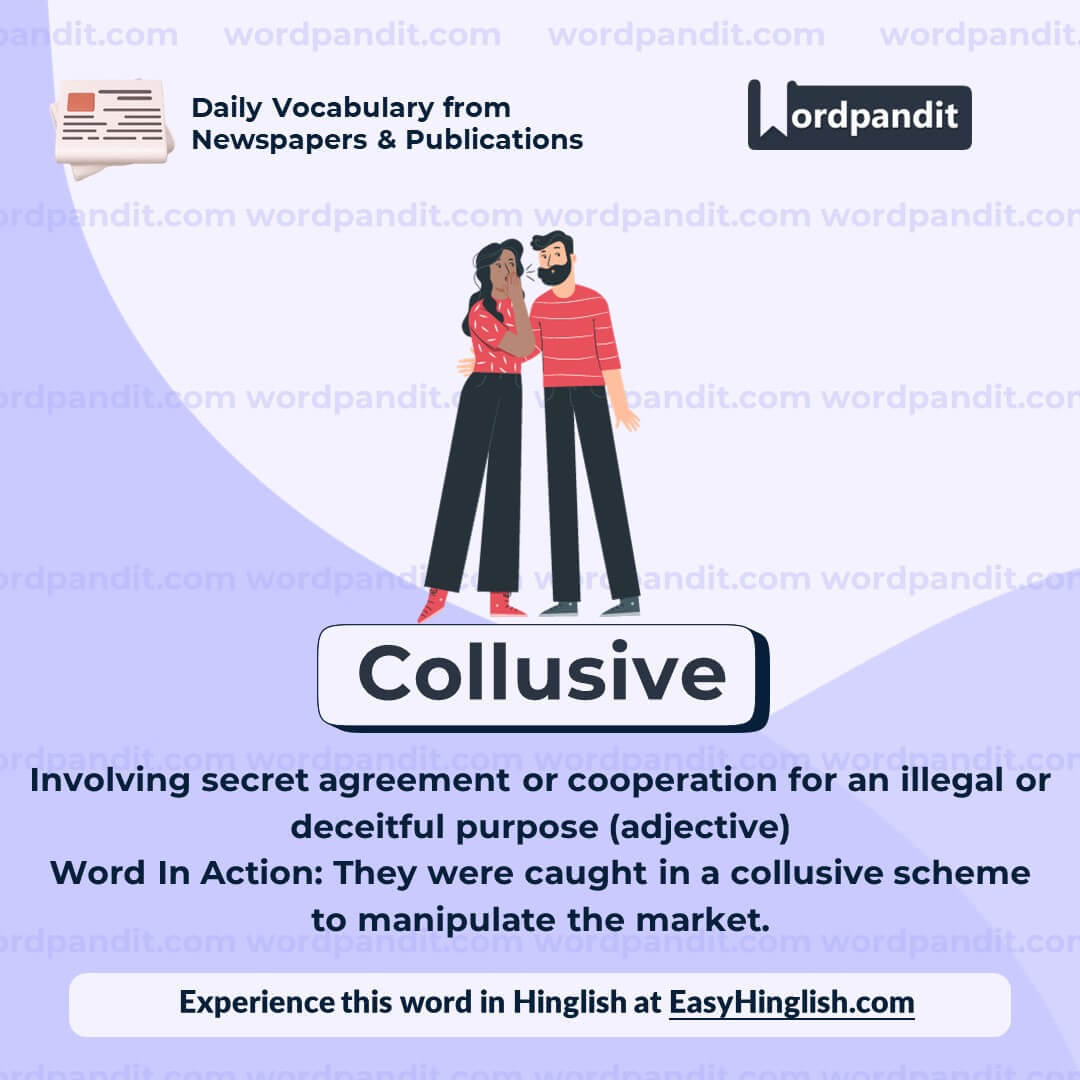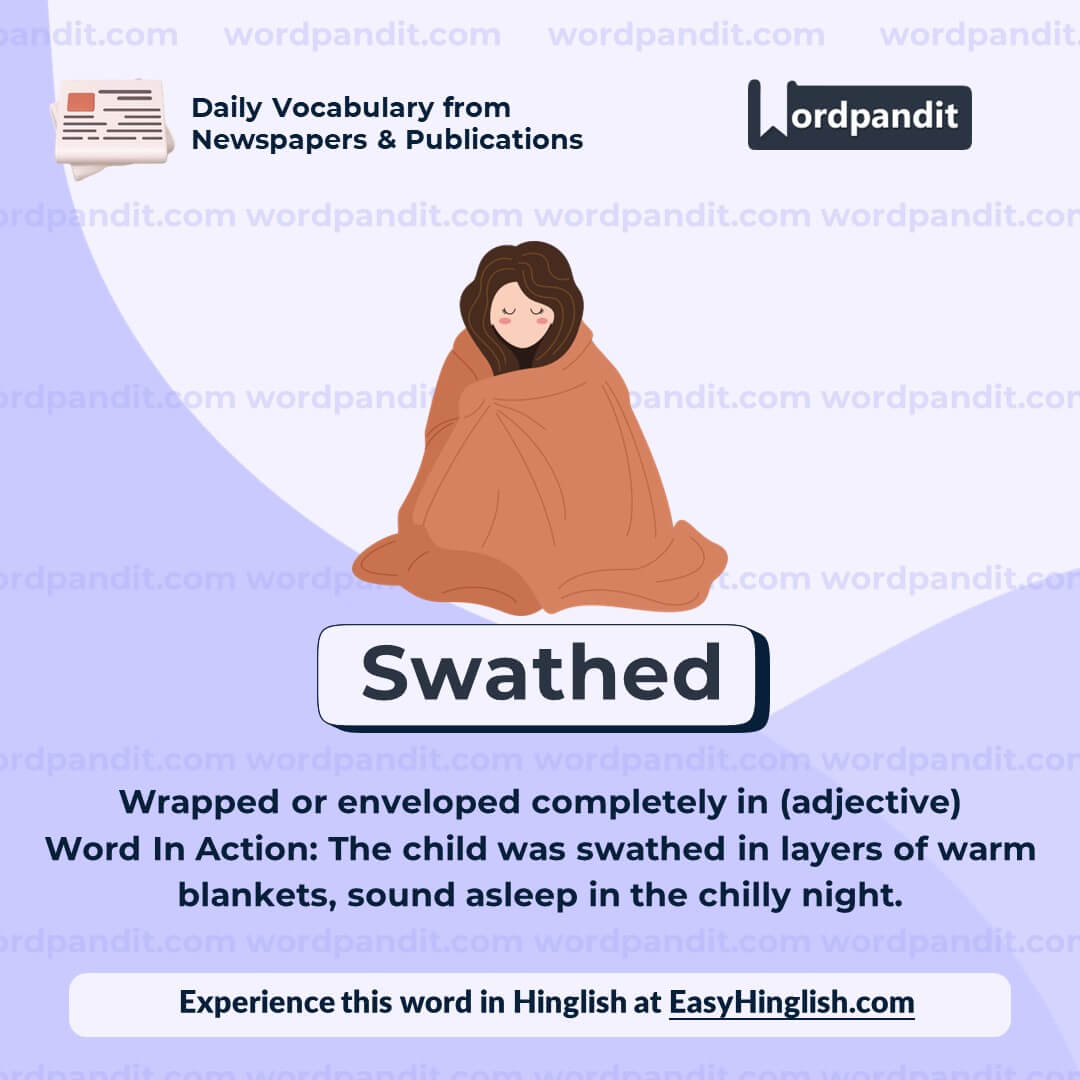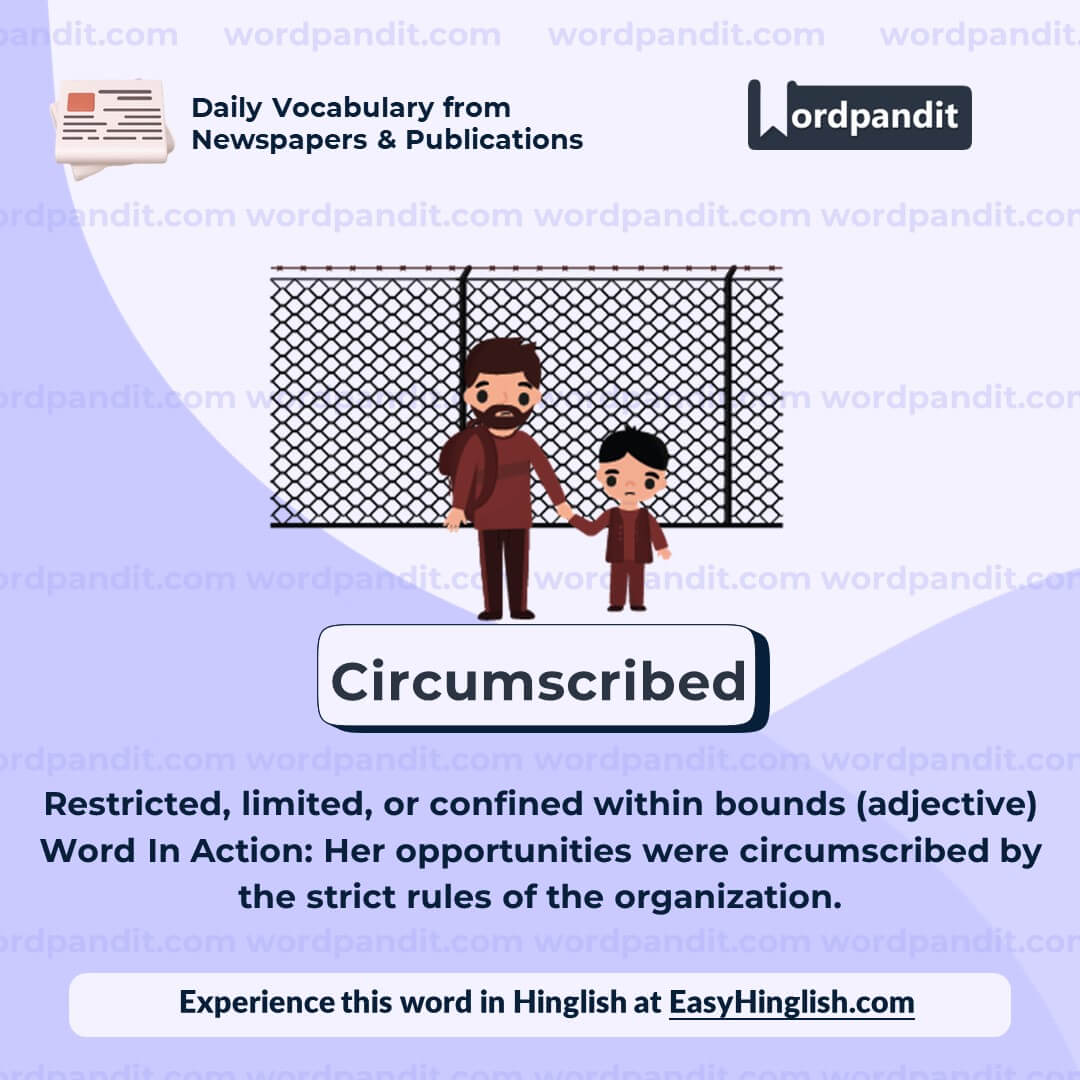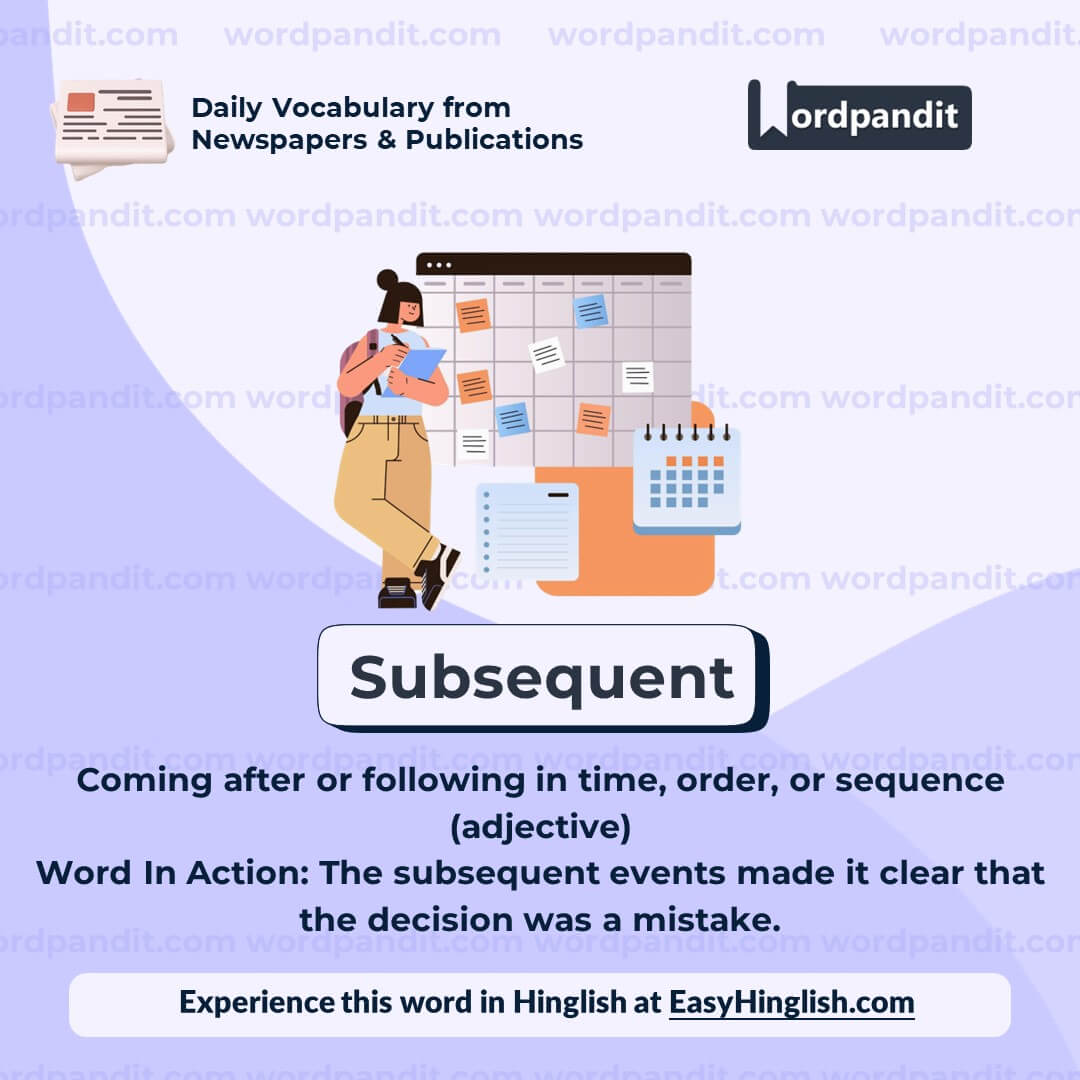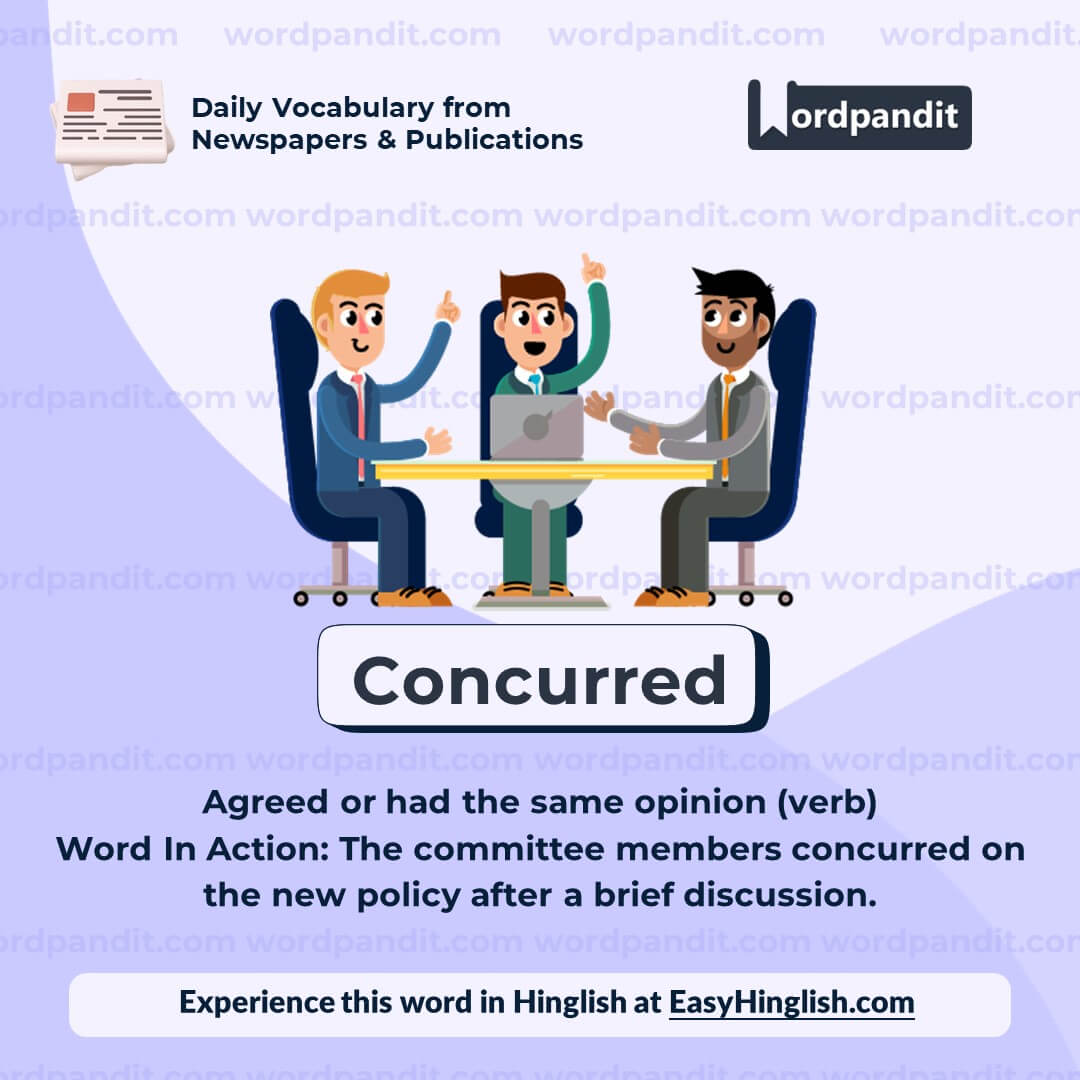Daily Vocabulary from Indian Newspapers and Publications
Welcome to Wordpandit’s Indian Vocabulary Hub
At Wordpandit, we understand the importance of staying rooted in the local context while expanding your language skills. This section focuses on enriching your vocabulary with words and phrases drawn from India’s leading newspapers and publications, ensuring you're learning vocabulary that is practical, relevant, and uniquely Indian.
Why Indian Sources Matter
We believe that the best way to master any language is by immersing yourself in local content. That’s why we carefully curate vocabulary from top Indian publications, including:
- The Hindu
- The Times of India
- The Economic Times
- Hindustan Times
- Live Mint
- The Indian Express
- And many others...
Stay Updated, Stay Relevant
With daily updates from Indian news sources, you’ll be consistently learning words that reflect the trends and shifts in Indian society and culture. Our focus is to provide vocabulary that enhances your understanding of the language in an Indian context.
How Wordpandit Supports Your Goals
Whether you’re preparing for exams, aiming to improve your professional communication, or simply want to stay connected with the latest Indian vocabulary, Wordpandit is here to guide you every step of the way.
Learn with a Practical Approach
Our interactive learning methodology includes real-world examples, engaging activities, and context-specific usage to ensure that every word becomes part of your active vocabulary.
Dive into Indian Vocabulary Today!
Why Choose Wordpandit?
Practical Learning: Focus on words you'll actually encounter in real-world reading, enhancing your comprehension and communication skills.
Diverse Content: From current affairs to scientific breakthroughs, our varied sources expose you to vocabulary across multiple domains.
Effortless Integration: Make Wordpandit a part of your daily routine. Just a few minutes each day can significantly boost your lexicon over time.
Your Path to Vocabulary Mastery
- Visit our Daily Vocabulary section regularly
- Explore new words and their usage in context
- Practice incorporating these words into your own writing and speech
- Track your progress as your vocabulary expands
Start Your Journey Today
Embark on your vocabulary enhancement journey with Wordpandit. By consistently engaging with our daily posts, you'll build a robust vocabulary that serves you well in academic, professional, and personal contexts.
Remember, a word a day keeps linguistic limitations at bay. Make Wordpandit your daily companion in the quest for vocabulary excellence!
WORD-1: Collusive
Context:
"Both latter assets too were badly needed, since their prevailing numbers were grossly inadequate, compared with similar platforms operated by India’s two collusive nuclear-armed rivals." - The Wire
Explanatory Paragraph:
The term "collusive" refers to an action taken in secret agreement between parties, often for deceptive or unethical purposes. In the context of the provided sentence, it implies that the two nuclear-armed rivals of India might be working together or aligning their strategies in ways that undermine India’s position.
Meaning: Involving secret agreement or cooperation for an illegal or deceitful purpose (adjective).
Pronunciation: kuh-LOO-siv
Difficulty Level: ⭐⭐⭐ Intermediate
Etymology: Derived from the Latin word "colludere," which means "to play together," from "com-" (together) and "ludere" (to play).
Synonyms & Antonyms:
Synonyms: Conspiratorial, secretive, conniving, underhanded
Antonyms: Open, transparent, honest, forthright
Usage Examples:
- The collusive behavior of the companies led to inflated prices for consumers.
- Investigators uncovered a collusive agreement between the contractors to rig the bidding process.
- She warned that the collusive actions of the two nations could destabilize the region.
- Such collusive practices are not only unethical but also illegal under competition laws.
Cultural Reference:
"Collusion" became a buzzword during political investigations in the United States, particularly in the context of alleged covert agreements between political entities. - News Reports
Think About It:
How can systems be designed to detect and prevent collusive agreements in politics and business?
Quick Activity:
Identify a news article or case study where collusive behavior was alleged or proven. Summarize the case and explain the consequences of the collusion.
Memory Tip:
Remember "collusive" by associating it with "collision"—when people’s hidden plans collide with fairness and ethics.
Real-World Application:
Understanding the concept of collusion is critical in fields like law, economics, and politics, where identifying unethical agreements can help maintain fairness and integrity in processes.
WORD-2: Swathed
Context:
"2016 acquisition of 36 Dassault Rafale fighters, he added, had been swathed in allegations of wrongdoing ahead of the 2019 Lok Sabha polls, and the BJP-led government wanted to avoid a repeat of such ‘unnecessary controversies.’" - The Wire
Explanatory Paragraph:
The word "swathed" means to be completely covered, surrounded, or wrapped in something. In the context of the sentence, it suggests that the acquisition of the Rafale fighters was enveloped in allegations and controversies, giving a sense of being thoroughly immersed or surrounded by those accusations.
Meaning: Wrapped or enveloped completely in (adjective).
Pronunciation: swothd
Difficulty Level: ⭐⭐ Beginner
Etymology: Derived from Old English "swathian," meaning "to swaddle or wrap."
Synonyms & Antonyms:
Synonyms: Wrapped, shrouded, cloaked, covered
Antonyms: Exposed, uncovered, revealed, unwrapped
Usage Examples:
- The bride was swathed in a beautiful silk saree for the wedding ceremony.
- As the fog thickened, the entire valley was swathed in an ethereal mist.
- The monument was swathed in scaffolding during its restoration.
- He was swathed in blankets to keep warm during the chilly night.
Cultural Reference:
The concept of being "swathed" is often used in literature and art to depict mystery or grandeur, such as figures swathed in cloaks or landscapes enveloped in mist. - Literary Themes
Think About It:
Why do you think authors and speakers often use "swathed" in both literal and metaphorical senses? How does it enhance the imagery?
Quick Activity:
Write a short paragraph using "swathed" to describe a scene, object, or situation, either literal or metaphorical.
Memory Tip:
Picture the word "swathed" as something “swaddled” in a blanket, much like a baby wrapped tightly for comfort.
Real-World Application:
"Swathed" is often used in descriptions to evoke a sense of being completely surrounded or hidden, whether in fashion, weather reports, or metaphorical language like describing controversies or mysteries.
WORD-3: Circumscribed
Context:
"Veterans and analysts ruled out the two Russian platforms, as the ongoing war in Ukraine circumscribed Moscow’s eventual ability to make good its offer." - The Wire
Explanatory Paragraph:
The word "circumscribed" means to restrict or limit something within certain boundaries. In the context of the sentence, it suggests that the war in Ukraine has placed significant restrictions on Moscow's capacity to fulfill its commitments, thereby limiting its ability to deliver on its offer.
Meaning: Restricted, limited, or confined within bounds (adjective).
Pronunciation: SUR-kuhm-skrybd
Difficulty Level: ⭐⭐⭐ Intermediate
Etymology: Derived from Latin "circum" (around) and "scribere" (to write), literally meaning "to draw a line around."
Synonyms & Antonyms:
Synonyms: Restricted, limited, confined, constrained
Antonyms: Unlimited, unrestricted, expansive, free
Usage Examples:
- The small garden was circumscribed by a white picket fence.
- Her creativity was circumscribed by the rigid rules of the competition.
- The new laws circumscribed the powers of local governments.
- His influence in the company was circumscribed to a specific department.
Cultural Reference:
The term "circumscribed" often appears in discussions of historical events, such as treaties or agreements that imposed limits on nations or rulers. For instance, the Treaty of Versailles circumscribed Germany's military capacity after World War I. - Historical Analysis
Think About It:
How do societal or political constraints circumscribe individual freedoms, and what are some ways people adapt to these limitations?
Quick Activity:
Write a sentence using "circumscribed" to describe a real or hypothetical situation where limitations were imposed.
Memory Tip:
Think of "circumscribed" as drawing a circle ("circum") around something to limit or contain it.
Real-World Application:
"Circumscribed" is commonly used in fields like law, politics, and personal development to describe restrictions or boundaries, helping articulate situations where freedom or capability is limited.
WORD-4: Subsequent
Context:
"His decade-long incarceration as a paraplegic and his subsequent death shortly after his release will remain a rising howl in the dark labyrinths of India’s justice delivery." - The Wire
Explanatory Paragraph:
The word "subsequent" refers to something that occurs or follows after a particular event or time. In the given context, it highlights that the death occurred after the individual's release from incarceration, emphasizing the sequence of events in a tragic narrative.
Meaning: Coming after or following in time, order, or sequence (adjective).
Pronunciation: SUB-suh-kwent
Difficulty Level: ⭐ Beginner
Etymology: Derived from the Latin word "subsequi," meaning "to follow after."
Synonyms & Antonyms:
Synonyms: Following, ensuing, later, succeeding
Antonyms: Previous, prior, preceding, earlier
Usage Examples:
- The storm caused heavy damage, and the subsequent flooding made the situation worse.
- Her promotion and subsequent raise significantly improved her financial situation.
- The accident led to subsequent changes in safety regulations.
- After completing his degree, he took up a subsequent role in a multinational company.
Cultural Reference:
In literature and storytelling, "subsequent" is often used to signal shifts in events or the aftermath of a critical moment. For instance, subsequent events in historical novels often reflect the consequences of major battles or decisions. - Literary Analysis
Think About It:
How does understanding subsequent events help in analyzing the causes and effects of significant historical or personal incidents?
Quick Activity:
Write a short paragraph using "subsequent" to describe the outcomes of a decision or event you recently experienced.
Memory Tip:
Link "subsequent" to "sequence"—both share the idea of following one thing after another in time.
Real-World Application:
"Subsequent" is frequently used in writing reports, news articles, and analyses to show the connection between events, making it a valuable word in both academic and professional communication.
WORD-5: Concurred
Context:
"IAF veterans concurred that acquiring additional Rafales made ‘commercial, logistical and operational’ sense, recent media reports had ruled the French fighter out of the MRFA contest." - The Wire
Explanatory Paragraph:
The word "concurred" means to agree or come to the same conclusion as someone else. In the context of the sentence, it suggests that Indian Air Force veterans were in agreement that acquiring additional Rafale jets was a practical decision from commercial, logistical, and operational perspectives.
Meaning: Agreed or had the same opinion (verb).
Pronunciation: kuhn-KURD
Difficulty Level: ⭐ Beginner
Etymology: Derived from the Latin word "concurrere," meaning "to run together" or "to agree."
Synonyms & Antonyms:
Synonyms: Agreed, assented, consented, aligned
Antonyms: Disagreed, opposed, contradicted, dissented
Usage Examples:
- The committee members concurred on the need to revise the policy.
- Historians concurred that the document was a significant discovery.
- Experts concurred that climate change poses a severe global threat.
- After much debate, they finally concurred to proceed with the plan.
Cultural Reference:
The word "concur" is often used in judicial and legislative contexts, where members of a panel or court may concur with a majority or dissenting opinion. For example, Supreme Court justices may issue concurring opinions to elaborate their agreement with a ruling. - Legal Terminology
Think About It:
Why is reaching concurrence or agreement often considered essential in team decision-making and collaborative efforts?
Quick Activity:
Think of a recent group decision you were part of. Write a sentence using "concurred" to describe the outcome.
Memory Tip:
Remember "concurred" as "con" (together) + "cur" (run)—people running or thinking together toward the same conclusion.
Real-World Application:
"Concurred" is commonly used in academic, professional, and legal settings to describe mutual agreement, making it a vital term for expressing collaboration or consensus in formal contexts.


